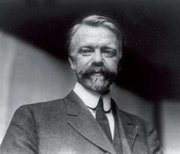
Henri Fayol pioneered the concept of management as coordinated functions and a comprehensive framework from which management could be studied and developed.
As one of the oldest and most popular approaches to management thought; Henri Fayol’s (29 July 1841–19 November 1925) theory holds that administration of all organizations—whether “public or private”, or “large or small” requires the same rational process or functions.
This school is based on two assumptions; first, although the objective of an organization may differ; for example, business, government, education, or religion, yet there is a core management process that remains the same for all institutions.
Successful managers, therefore, are interchangeable among organizations of differing purposes.
Second, the Administrative management process can be reduced to a set of separate functions and related principles.
It has rightly been said by some scholars that “perhaps the real father of modern management theory is the French industrialist Henri Fayol.” 1916 he published “Administration Industrielle et Generale”.
It was translated and republished in English in 1929.
In 1949 His book was published in the USA and from then his ideas became famous. In the world, his book left a permanent mark on management thinking.
A successful industrialist, Fayol headed a steel and coal combine in France.
He is by now considered the father of the Universal process of Operational management or Administrative management theory because he made universal generalizations about management based on his keen insight and practical management experience.
As opposed to Taylor, Fayol endeavors to deal with “classical administration.” He focuses his attention on the enterprise as a whole rather than on a single segment of it.
He pioneered the concept of viewing management as being made up of functions, and his work supplied a comprehensive framework from which management could be studied and developed.
He also repeatedly emphasized that his principles apply not only to business but also to political, religious, philanthropic, military and other undertakings.
Industrial Activities Identified by Fayol
Fayol identifies the following six major activities of any industrial or business organization:
- Technical (production and manufacturing);
- Commercial (buying, selling and exchanging);
- Financial (search for optimum use of capital);
- Security (safeguarding property and people);
- Accounting (including statistics); and
- Managerial.
Specifying the functions or elements of the management process
While pointing out the existence of these activities in the business of any kind or size, Fayol particularly stresses the analysis of the sixth, devoting a substantial portion of his book (mentioned earlier) to this aspect of management.
He specified 5 managerial functions;
- Planning.
- Organizing.
- Commanding.
- Coordinating.
- Controlling.
Fayol’s Principles of Management
In addition to these management activities, Fayol identified fourteen universal principles of management which are aimed at showing managers how to carry out their functional duties. He followed them.
Fayol thought that the application of these principles should be flexible enough to match each specific organizational situation.
Subsequently, however, the rigid application of these functions by managers came under criticism.
Fayol suggested the “management” be accepted as a body of knowledge and suggested to include it in college and universities as a field of study.
His contention that management is a continuous process beginning with planning and ending with controlling also remains popular today and can be found in nearly all management texts.
It’s him who we should thank for the place where “management” is now.